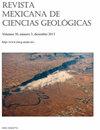飓风在Volcán de Colima引起的火山泥流:地震特征和数值模拟
IF 0.5
4区 地球科学
Q4 GEOSCIENCES, MULTIDISCIPLINARY
Revista Mexicana De Ciencias Geologicas
Pub Date : 2023-04-01
DOI:10.22201/cgeo.20072902e.2023.1.1709
引用次数: 0
摘要
Volcán de Colima火山是墨西哥最活跃的火山之一,在过去的一个世纪里,它经历了几次火山危机,大量的块状和火山灰流沉积物在主要峡谷中形成了大量的松散物质。在雨季,这种物质很容易被侵蚀形成火山泥流。每年检测到40多个不同震级(105-106立方米)的事件。对基础设施造成破坏的最大事件通常发生在飓风季节(从8月中旬到10月),这段时间的降雨量通常超过250毫米。2015年10月23日,飓风帕特里夏袭击了Volcán de Colima。飓风被宣布达到5级,因此是墨西哥有史以来最大的飓风事件。它在登陆后迅速减弱,但沿着直线向火山移动。30小时内录得雨量达400毫米。这一事件是在位于火山西南侧翼La Lumbre峡谷中段的一个监测站记录下来的,该监测站配备了雨量计、检波器(10赫兹)和摄像机。多脉冲火山泥流于格林尼治时间晚上8点左右开始,持续了5个多小时。对地震信号和视频图像进行分析,确定主脉冲时间、沉积物浓度和最大流量峰值流量。从地震信号的频率内容上看,泥流在最大流深为8 m的泥石流范围内具有3个主脉冲特征,其间穿插着较稀的尾流,为高浓度流。根据地震幅值与流量的强相关性,估计其总体积为2.5 × 106 m3。火山泥流摧毁了一座桥梁和大约500米的州际公路,导致几个村庄被切断了几天的交通。根据流量大小、持续时间和相关损害,这次事件可能是近20年来有记录以来最大的一次。利用FLO-2D模型复制观测到的事件,以估计沿火山的五个主要沟壑的火山泥流的最大淹没极限,试图为飓风引发的灾难性事件设计危险图。本文章由计算机程序翻译,如有差异,请以英文原文为准。
Hurricane-induced lahars at Volcán de Colima (México): seismic characterization and numerical modeling
The Volcán de Colima, one of the most active volcanoes in Mexico, has experienced several volcanic crises over the last century with the emplacement of voluminous block-and-ash flow deposits providing large volumes of loose material along the main ravines. During the rainy season, this material is easily eroded forming lahars. Over 40 events with variable magnitude (105-106 m3) have been detected each year. The largest events that cause damages to infrastructure are usually triggered during the hurricane season (from mid-August to October) when more than 250 mm of rain usually are accumulated over a few days. On 23 October 2015, Hurricane Patricia hit the Volcán de Colima. The hurricane was announced as having reached category 5 thereby representing the largest ever recorded hurricane event in Mexico. It rapidly weakened after landfall but followed a straight trajectory toward the volcano. Up to 400 mm of rain were recorded over 30 hours. The event was recorded at a monitoring station located in the middle reaches of the La Lumbre ravine on the SW flank of the volcano, which was equipped with a rain gauge, a geophone (10 Hz), and a video camera. A multi-pulse lahar started around 8 pm (GMT) and lasted for more than five hours. The seismic signal and the video images were analyzed to identify the timing of the main pulses, the sediment concentrations, and maximum flow peak discharge. Data show that the lahar was characterized by three main pulses, in the range of debris flows with maximum flow-depth of 8 m, interspersed by more dilute tails as hyperconcentrated flow, as also observed from the frequency contents of the seismic signal. A total volume of 2.5 × 106 m3 was estimated based on the strong correlation between the seismic amplitude and the flow discharge. The lahar destroyed one bridge and ~500 m of the interstate road leaving several villages cut off for a few days. Based on the flow magnitude, duration, and the associated damage, this event probably represents the largest one recorded over the last 20 years. The FLO-2D model was used to replicate the observed event to estimate the maximum inundation limits of lahars along the five principal ravines of the volcano, in an attempt to design a hazard map for catastrophic hurricane-induced events.
求助全文
通过发布文献求助,成功后即可免费获取论文全文。
去求助
来源期刊

Revista Mexicana De Ciencias Geologicas
地学-地球科学综合
CiteScore
1.00
自引率
12.50%
发文量
0
审稿时长
6-12 weeks
期刊介绍:
Revista Mexicana de Ciencias Geológicas (RMCG) publishes original research papers on geological processes of broad interest, and particularly those dealing with regions of Latin America. The RMCG also publishes review papers on topics of current interest, and on the geology and tectonics of geological provinces of Latin America. Besides, it offers the opportunity for host editors to publish special thematic issues.
 求助内容:
求助内容: 应助结果提醒方式:
应助结果提醒方式:


